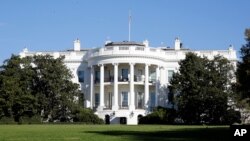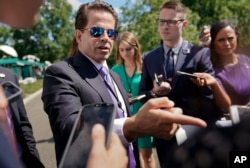Tense White House staffers are bracing for firings following President Donald Trump's vow to root out leakers of information.
"Leakers are traitors and cowards and we will find out who they are!" Trump said in a tweet Monday.
Some attorneys with national security backgrounds see as extreme the president's assertion that leakers are committing treason, a crime punishable by imprisonment or even death.
"I think that the word 'traitor' is overused and should be reserved for people who commit treason as defined in the law," said Robert Litt, a former general counsel to the director of national intelligence. "Leaking isn't treason. If classified information is leaked, that's a crime and should be prosecuted."
Some in the White House interpret what is happening more akin to a prison knife fight than to subversion.
White House staffers are using "media to shiv [stab with a makeshift weapon] each other," Kellyanne Conway, a counselor to the president, said on Fox News, adding that she expected personnel changes amid an effort to identify leakers.
McCain comment
Trump's latest outburst about leaks appears to have been triggered by comments from an internal West Wing meeting at which one aide made a morbid remark about Republican Senator John McCain.
White House communications aide Kelly Sadler has been widely quoted as saying McCain's vote in Congress no longer mattered because "he's dying anyway."
The 81-year-old Arizona senator is being treated for an aggressive and deadly form of brain cancer.
A subsequent scolding about the leak by White House press secretary Sarah Sanders delivered to staff behind closed doors also quickly leaked, which Sanders accurately predicted would happen.
"Leaking snippets of unclassified conversations — such as the comment about Senator McCain — is not a criminal act," Litt told VOA. "But it's a breach of trust, and a government official would be well within his or her rights to fire someone who leaked confidential conversations. The prevalence of leaking from this White House suggests a failure to establish a culture of trust and loyalty."
Asked about the issue during Monday's scheduled briefing, principal deputy press secretary Raj Shah told reporters: "If you aren't able in internal meetings to speak your mind or convey thoughts or say anything that you feel without feeling like your colleagues will betray you, that creates a difficult work environment."
Trump has previously complained about leaks during his administration, as have those working for him.
"I'm going to fire everybody," then-White House communications director Anthony Scaramucci told reporters last July. "You're going to stop leaking, or you're going to be fired."
Scaramucci, ironically, was the next one out the West Wing doors following publication of profanity-laced insults he made about colleagues in a phone conversation with a magazine reporter.
History of presidential leaks
Bitter presidential complaints about leaks go back at least to President Woodrow Wilson, according to Columbia University law professor David Pozen.
Most notable was former President Richard Nixon's covert use of the so-called White House plumbers to stop the leak of classified information to reporters. Its members, working for Nixon's re-election committee, strayed into illegal activities, including the infamous Watergate building burglary that led to the downfall of the Republican's presidency.
A number of other presidents from both parties have also made attempts to plug internal leaks, small and large.
"Thankfully, U.S. law enforcement officials have long appreciated that those who disclose information to the media in an effort to inform public debate should not be lumped together with those who give sensitive national security information directly to foreign countries," Pozen told VOA.
New York Times White House correspondent Maggie Haberman tweeted in response to Trump's latest complaint about leaks: "Sometimes the person yelling the most about leakers is doing the leaking."
Haberman has frequently interviewed Trump, going back years prior to his presidency. Trump has denied she has access to him and has called Haberman a "Hillary flunky," a reference to former secretary of state Hillary Clinton, the Democratic Party opponent Trump defeated in the 2016 presidential election.
CNN reported on Tuesday that regular sweeps have been carried out in the West Wing since a ban on personal cellphones was put in place in January. Men in suits carrying machines have gone from room to room to detect unauthorized devices, according to the network.
Several West Wing staff members told VOA they have not noticed any such recent activity.
The Secret Service referred queries to the White House, which has not responded to a request for a comment on the CNN report.









